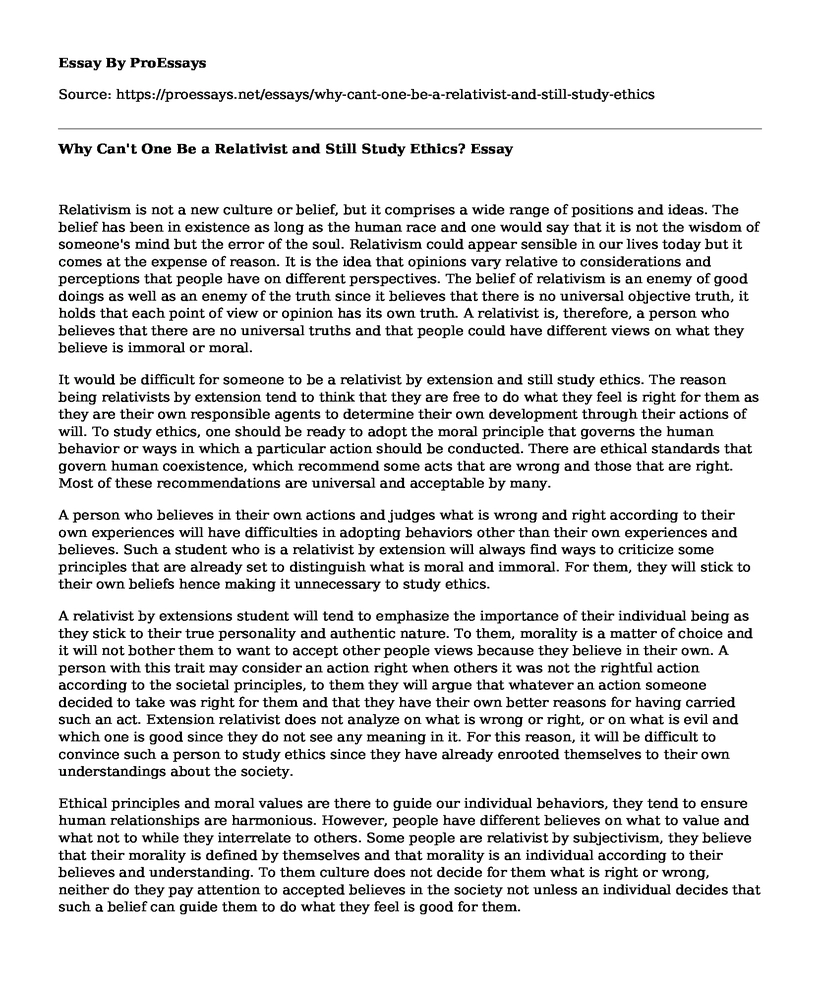Relativism is not a new culture or belief, but it comprises a wide range of positions and ideas. The belief has been in existence as long as the human race and one would say that it is not the wisdom of someone's mind but the error of the soul. Relativism could appear sensible in our lives today but it comes at the expense of reason. It is the idea that opinions vary relative to considerations and perceptions that people have on different perspectives. The belief of relativism is an enemy of good doings as well as an enemy of the truth since it believes that there is no universal objective truth, it holds that each point of view or opinion has its own truth. A relativist is, therefore, a person who believes that there are no universal truths and that people could have different views on what they believe is immoral or moral.
It would be difficult for someone to be a relativist by extension and still study ethics. The reason being relativists by extension tend to think that they are free to do what they feel is right for them as they are their own responsible agents to determine their own development through their actions of will. To study ethics, one should be ready to adopt the moral principle that governs the human behavior or ways in which a particular action should be conducted. There are ethical standards that govern human coexistence, which recommend some acts that are wrong and those that are right. Most of these recommendations are universal and acceptable by many.
A person who believes in their own actions and judges what is wrong and right according to their own experiences will have difficulties in adopting behaviors other than their own experiences and believes. Such a student who is a relativist by extension will always find ways to criticize some principles that are already set to distinguish what is moral and immoral. For them, they will stick to their own beliefs hence making it unnecessary to study ethics.
A relativist by extensions student will tend to emphasize the importance of their individual being as they stick to their true personality and authentic nature. To them, morality is a matter of choice and it will not bother them to want to accept other people views because they believe in their own. A person with this trait may consider an action right when others it was not the rightful action according to the societal principles, to them they will argue that whatever an action someone decided to take was right for them and that they have their own better reasons for having carried such an act. Extension relativist does not analyze on what is wrong or right, or on what is evil and which one is good since they do not see any meaning in it. For this reason, it will be difficult to convince such a person to study ethics since they have already enrooted themselves to their own understandings about the society.
Ethical principles and moral values are there to guide our individual behaviors, they tend to ensure human relationships are harmonious. However, people have different believes on what to value and what not to while they interrelate to others. Some people are relativist by subjectivism, they believe that their morality is defined by themselves and that morality is an individual according to their believes and understanding. To them culture does not decide for them what is right or wrong, neither do they pay attention to accepted believes in the society not unless an individual decides that such a belief can guide them to do what they feel is good for them.
A person who is a relativist by subjection will find it uneasy for them to study ethics since they have their own beliefs which they have subjected themselves to. Shifting their minds to adopt the ethical standards might seem unconvincing for them and they stick to their authentic true self as they will want to depend on their own personalities to tell what is wrong or right for them. They believe that morality is not dependent on the values of the society but rather individual values. To this group of people who are relativists by subjection, anything is okay as long as everyone lives on their own principles.
Conclusion
People have different cultures and deciding on a universal way of differentiating on what is right or wrong will not b easy. Ethics need to consider different cultures, and if it does not then a person who is a relativist by subjection will have difficulties in accepting ideas of ethics. Forcing them to stick to their own believes and understanding. Individuals with this trait are justified of doing whatever they feel is right for them, decide for themselves on what convinces them not considering the views of the society and they can pursue any desire that they feel they might have. The logical thinking in these individuals will make them not to be willing to study ethics or accept ideologies from ethics.
Cite this page
Why Can't One Be a Relativist and Still Study Ethics?. (2022, May 17). Retrieved from https://proessays.net/essays/why-cant-one-be-a-relativist-and-still-study-ethics
If you are the original author of this essay and no longer wish to have it published on the ProEssays website, please click below to request its removal:
- Personal Essay Example: Struggling with Identity
- Ethics Issues in Social Media Research
- My Understanding of Leadership and an Ethical Leader Essay
- Essay Sample on Social Philosophy - Ethics
- Can Cultural Relativism Be Used to Excuse Behavior That Harms Others? - Essay Sample
- Feminist Concepts: Patricia Hill Collins & Standpoint Epistemology - Essay Sample
- Essay Sample on Understanding Socio-Cultural Theories: Impact on Human Behavior & Learning







